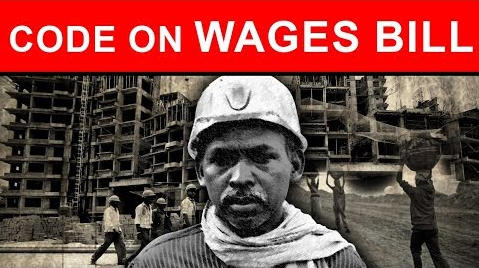Table of Contents
Select the correct option.
- Matters related to labour comes under Union List of 7 th Schedule.
- India has ratified both Convention No.138 & Convention No. 182 of International Labour Organisation.
A)- Only 1
B)- Only 2
C)- Both 1 & 2
D)- None of the above

- The bill lapsed at the end of 16th Lok Sabha. Hence the new bill.
PROBLEM WITH CURRENT WAGE ACT
- The current Minimum Wages Act and the Payment of Wages Act apply only to employees engaged in certain kinds of jobs.
- Whereas the new bill will cover employees in both the organised and unorganised sectors.
WHAT IS THE NEW CODE ON WAGES
- The Code on Wages is the first of four proposed labour bills long envisaged to replace 44 archaic labour laws.

- The Code on Wages Bill replaces four existing laws:
- the Payment of Wages Act, 1936,
- the Minimum Wages Act, 1948,
- the Payment of Bonus Act, 1965,
- the Equal Remuneration Act, 1976.

FEATURES
- The union govt. will set minimum wages for certain employments including railways, and mines.
- State governments will set minimum wages for all other employments.
- A national minimum wage may be set by the central government.
- States cannot set minimum wages lower than the national minimum wage
- The bill also allows the Centre to set different national minimum wages for different parts of the country.
- Wages must be revised by the central or state governments every five years.
- The overtime rate will be at least twice the normal rate of wages of the employee.
- It also allows payment of wages by depositing the same in the bank account of the employees, electronically or by cheque.
- The Bill also provides for an appellate authority for speedier dispute resolution.
- The central government and state governments will constitute the Central Advisory Board and State Advisory Boards respectively.
- These boards will consist of:
- employers,
- employees in equal number as the employers,
- independent persons.
- They will advise the central or state governments on issues such as setting and revision of minimum wages
MOST IMPORTANT BENEFIT
- It will further enhance the ease of doing business in the country

SHORTCOMINGS IN THE BILL
- If existing minimum wages set by states are higher than the national minimum wage, they cannot reduce the minimum wages.
- Currently, state governments have flexibility in revising minimum wages, as long as it is not more than five years. It is still unclear why this provision has been removed.
- While the Code prohibits gender discrimination on wage-related matters, it does not include provisions regarding discrimination during recruitment.
Q- Select the correct option.
- Matters related to labour comes under Union List of 7 th Schedule.
- India has ratified both Convention No.138 & Convention No. 182 of International Labour Organisation.
A)- Only 1
B)- Only 2
C)- Both 1 & 2
D)- None of the above
Latest Burning Issues | Free PDF






















 WhatsApp
WhatsApp